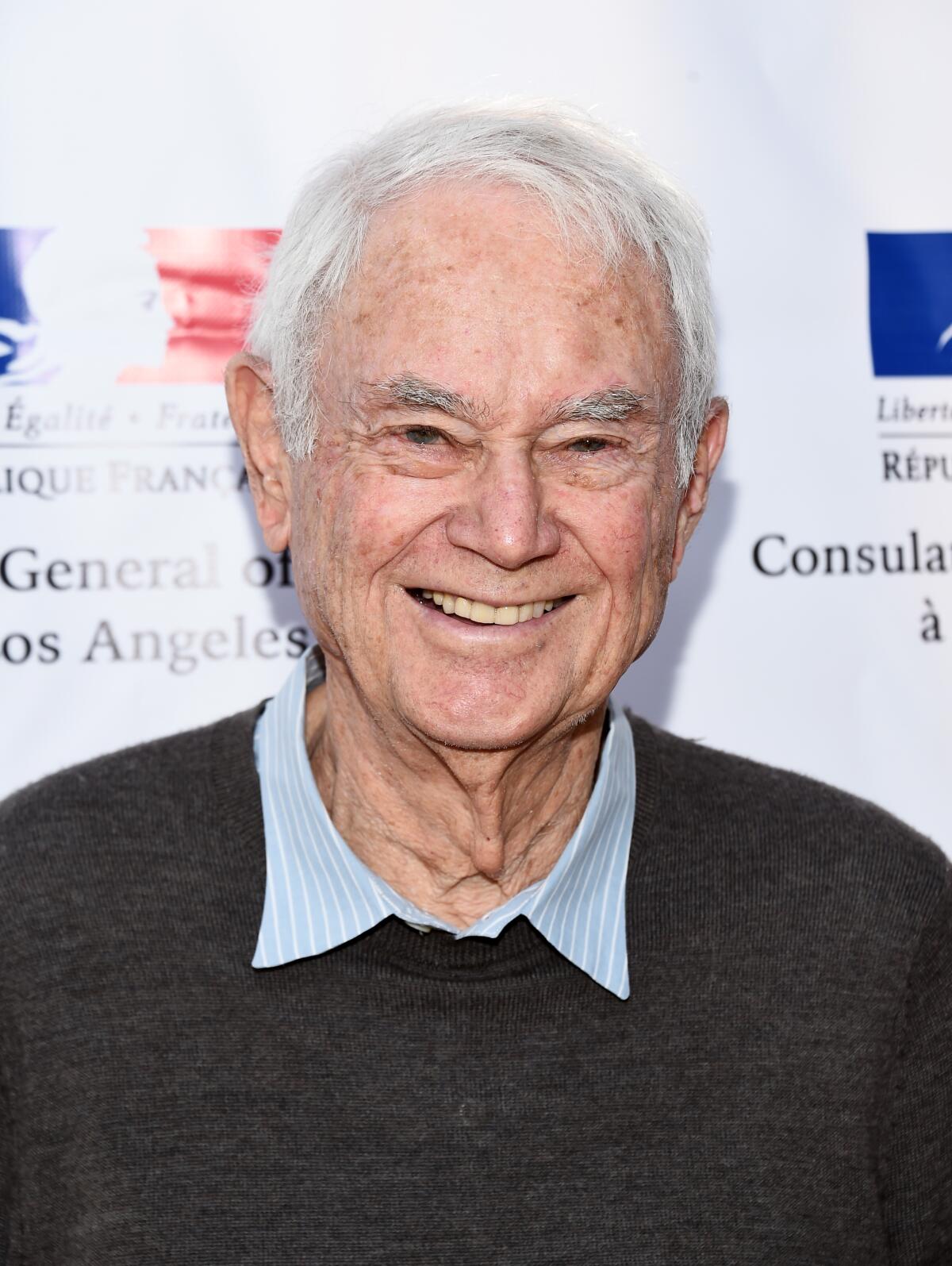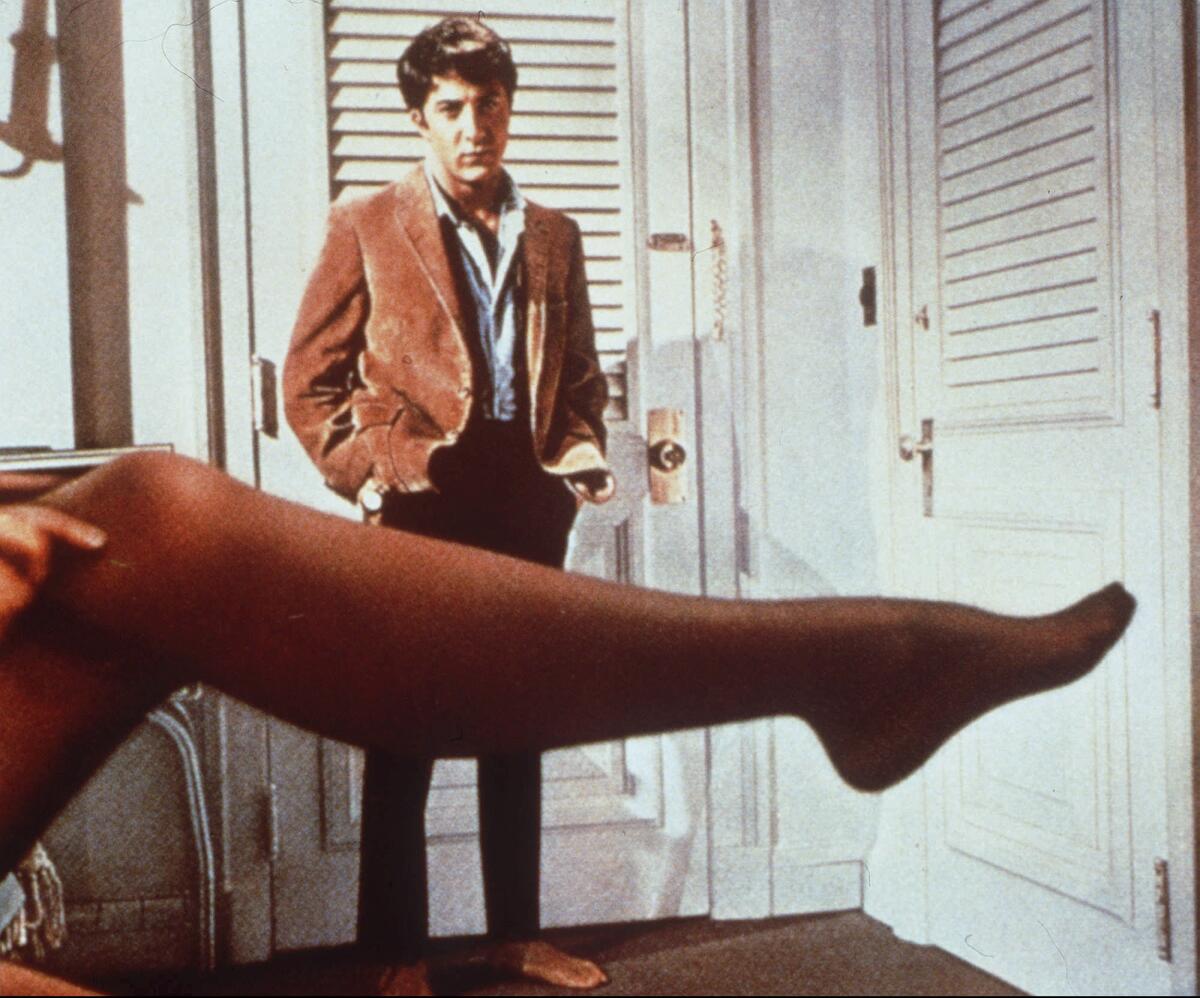Lawrence Turman, Oscar-nominated producer of ‘The Graduate,’ dies at 96

- Share via
Lawrence Turman, the Oscar-nominated producer of “The Graduate” and “American History X,” has died. He was 96.
Turman died Saturday at the Motion Picture & Television Fund’s retirement community in Woodland Hills. His son John Turman confirmed his death to The Times.
The veteran producer was born in Los Angeles on Nov. 28, 1926, to Esther Goldberg and Jacob M. Turman. “An L.A. boy through and through,” according to sons Peter and Andrew Turman on social media, he graduated from Los Angeles High School, served two years in the U.S. Navy and then pursued a liberal arts degree at UCLA. After graduating from college, Turman worked for his father’s fabric and upholstery shop in downtown L.A., which he said was not the line of work for him — he’d always had stars in his eyes for theater and film.
Turman broke into the business in 1955. He was flipping through the pages of Variety when he came across a job posting — the Kurt Frings talent agency, which represented Elizabeth Taylor and Audrey Hepburn, was looking to hire an agent’s assistant. He responded to the ad, writing that, although he had no experience, he was full of energy and would work cheaply.
He was quickly promoted to agent and represented actors who starred in Alfred Hitchcock’s “North by Northwest” before pivoting away from representation and becoming a producer.
“He leapt to producing by partnering with a seasoned producer and cut his teeth making a handful of films you’ve never heard of,” brothers Peter and Andrew Turman said on Andrew’s Instagram. “Branching out on his own, he optioned a book that spoke to him, and pulled in a stage director who was unrated in film and scraped together financing. That film was ‘The Graduate.’ ”
Turman’s zest for the film industry carried him through a prolific career that spanned more than six decades. He produced more than 40 films, two of which he directed, and in 1991 he signed on to head USC’s esteemed Peter Stark Producing Program, a post he held until he retired two years ago at 94.
“The Graduate” charmed most everyone when it arrived in theaters 50 years ago, topping the 1967 box office, winning Mike Nichols an Academy Award for best director, turning a little-known stage actor named Dustin Hoffman into a movie star and becoming an evergreen generational touchstone.
Among his most-well known films are “The Graduate” (1967), “The Great White Hope” (1970), “The Thing” (1982), “The River Wild” (1994) and “American History X” (1998). He also wrote a book, “So You Want to Be a Producer,” in which he detailed the tricks of the trade.
“He married my mother in 1958. After a rollicking time in a great, rambling house in Brentwood, they divorced” in the early 1970s, his sons wrote. Turman remarried twice, “had another significant relationship, and flirted embarrassingly but successfully till the end.”
They noted that their father ate a papaya daily “despite the fact that he did not like fruit but because he believed it was healthy for him.” He also swam laps to keep fit. “I remember him, in his 90s and yes, in his speedo (yikes), crossing the large bay in front of Hotel Mauna Kea. Amazing.”
Turman credited his gray hair to producing Judy Garland’s last film, 1963’s “I Could Go On Singing.” In 1974, he and producer David Foster linked up and would remain partners for 20 years. In 1994, Foster told The Times, “Larry is the opera and the symphony.” Together they produced “The Drowning Pool,” a whodunit starring Paul Newman and Joanne Woodward; “Heroes,” starring Henry Winkler; “Mass Appeal,” starring Jack Lemmon; “The Mean Season”; “Running Scared,” with Billy Crystal and Gregory Hines; and “Short Circuit” and its sequel.

“I was famous after ‘The Graduate’ for about 20 minutes,” Turman said in a 2017 interview. “It’s nice to get a better table at the restaurant, but basically, that doesn’t motivate me. I never even thought about fame. I was inundated with telephone calls and letters and scripts after the film’s success. That’s Hollywood. Fame is ephemeral and gives us life. I was asked to run a few studios, be head of production. But that lasted for nearly a year, then the next flavor-of-the-month producer would come through.
“A good producer is a creative person. The top people in the field are creative. But producers do not receive a lot of respect,” he said. “Go out in the street and stop a dozen strangers and ask what a writer does, what a director does, what an actor does, and you’ll get a correct answer. If you ask what a producer does, you’ll get a blank look. Nobody knows what we do. My definition is it’s the person who causes the film to be made.”
Turman’s son John Turman, a screenwriter known for “Hulk” and “Ticking Clock,” told The Times via email that growing up, he was “lucky enough to eavesdrop” on his father’s conversations with friends who were “some of the great writers, William Goldman, Ernest Lehman, Lorenzo Semple Jr., Neil Simon, so many more.”
“My father’s career really tracked the golden age of Hollywood cinema. His prime was the ’60s, ’70s and ’80s. He was passionate about the art as well as the business and used to say that it all begins with a good script. He would have advised today’s producers, as he did his USC students, to respect your collaborators. His passing marks the end of an era. For anybody who loves cinema, it’s maybe worth reflecting on these values in his memory, as the industry he loved looks for a way forward.”
It’s a miracle that producing partners Lawrence Turman and David Foster have stayed together over the years.
Tributes for Turman flooded social media after the news of his death. Former students, colleagues and relatives shared anecdotes and accolades, heralding the filmmaker for his passion and kindness. “RIP Larry Turman. You were special. And I will never forget how you drilled in me two very near and dear lessons: 1) Personal life and family above movies ... always. 2) It will take time, this business is more about the stomach you have than the talent,” wrote former student Iram Parveen Bilal on Facebook.
“I worked with Larry Turman on ‘American History X.’ He was a considerate, thoughtful and wise producer, insightful on the process,” Michael Mandaville wrote on Facebook. “Always remembered for getting behind ‘The Graduate’ novel as a movie, his experience and his telling of it to me made me realize how one’s belief overwhelms the obstacles. RIP Larry Turman.”
David Kirkpatrick, who produced “Rasputin” and “Big Night,” also memorialized Turman on social media, writing, “One of the kindest producers I have ever met. He put down his own $1,000 to option the novella, ‘The Graduate’ by Charles Webb. . . When I last spoke to him, when he officially retired from USC, he told me he was ‘just waiting for the horses and chariots of fire to take him away.’ I hope he had a good ride. He certainly had a good one on Earth.”
A service will be held at the MPTF retirement community at a later date. His family told The Times that, in lieu of flowers, donations may be made to the Larry Turman Endowed Fund for the Peter Stark Program — USC School of Cinematic Arts.
Turman is survived by three sons, John, Andrew and Peter; four grandchildren; and two nieces, Katherine and Suzanna.
More to Read
The biggest entertainment stories
Get our big stories about Hollywood, film, television, music, arts, culture and more right in your inbox as soon as they publish.
You may occasionally receive promotional content from the Los Angeles Times.











